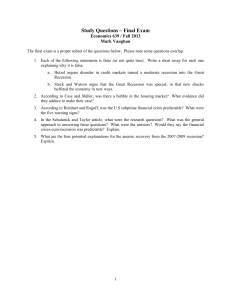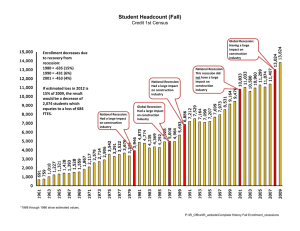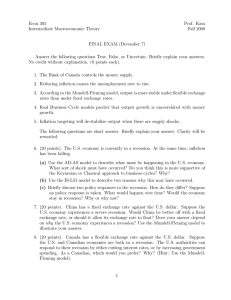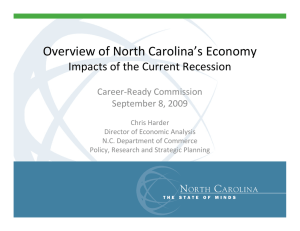Managing Supply Chains in a Recession Dr Peter Baker
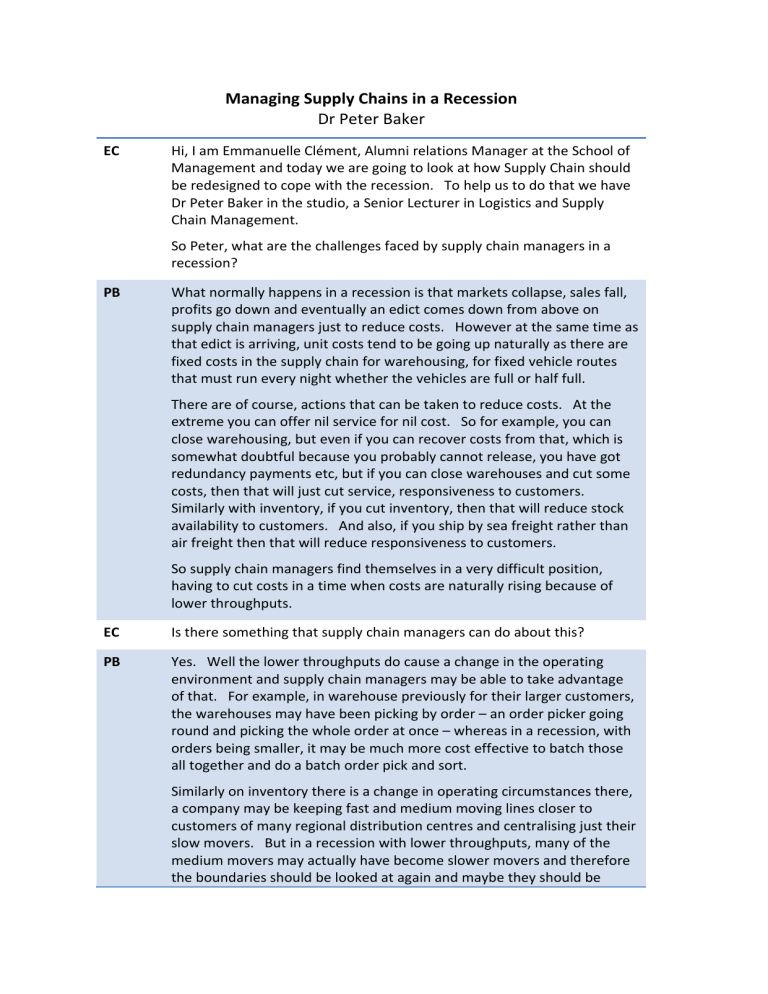
EC
PB
EC
PB
Managing Supply Chains in a Recession
Dr Peter Baker
Hi, I am Emmanuelle Clément, Alumni relations Manager at the School of
Management and today we are going to look at how Supply Chain should be redesigned to cope with the recession.
To help us to do that we have
Dr Peter Baker in the studio, a Senior Lecturer in Logistics and Supply
Chain Management.
So Peter, what are the challenges faced by supply chain managers in a recession?
What normally happens in a recession is that markets collapse, sales fall, profits go down and eventually an edict comes down from above on supply chain managers just to reduce costs.
However at the same time as that edict is arriving, unit costs tend to be going up naturally as there are fixed costs in the supply chain for warehousing, for fixed vehicle routes that must run every night whether the vehicles are full or half full.
There are of course, actions that can be taken to reduce costs.
At the extreme you can offer nil service for nil cost.
So for example, you can close warehousing, but even if you can recover costs from that, which is somewhat doubtful because you probably cannot release, you have got redundancy payments etc, but if you can close warehouses and cut some costs, then that will just cut service, responsiveness to customers.
Similarly with inventory, if you cut inventory, then that will reduce stock availability to customers.
And also, if you ship by sea freight rather than air freight then that will reduce responsiveness to customers.
So supply chain managers find themselves in a very difficult position, having to cut costs in a time when costs are naturally rising because of lower throughputs.
Is there something that supply chain managers can do about this?
Yes.
Well the lower throughputs do cause a change in the operating environment and supply chain managers may be able to take advantage of that.
For example, in warehouse previously for their larger customers, the warehouses may have been picking by order – an order picker going round and picking the whole order at once – whereas in a recession, with orders being smaller, it may be much more cost effective to batch those all together and do a batch order pick and sort.
Similarly on inventory there is a change in operating circumstances there, a company may be keeping fast and medium moving lines closer to customers of many regional distribution centres and centralising just their slow movers.
But in a recession with lower throughputs, many of the medium movers may actually have become slower movers and therefore the boundaries should be looked at again and maybe they should be
EC
PB
Dr Peter Baker centralised.
And also on transport.
Where there were direct loads before of full vehicle loads from factories to customers, maybe with lower throughput it’s more cost effective to consolidate transport or even to share transport with other companies or even competitors, in order to reduce costs.
So supply chain managers can take advantage of the changed situation in a recession, but even with these measures they are unlikely to completely counteract the naturally increasing unit costs with a lower throughput.
So what should supply chain managers do?
Can they be more proactive in any way?
Yes.
Businesses need to recognise that the marketplace has changed in a recession and need to reformulate strategy.
A traditional way of doing is for the business heads to formulate the strategy and for this then to be fed down to the functional areas such as retail, manufacturing, supply chain, etc.
What I would say is that supply chain managers need to be at the table in that strategy formulation.
For example, in addressing which market segments should be attacked or should be retrenched to, then the supply chain infrastructure may be a key competitive advantage or disadvantage to that and therefore supply chain managers need to be there to advise on these.
Similarly, looking at critical success factors for different market segments, then many of these may be supply chain related, such as inventory availability or on time delivery, for example.
It also needs to be recognised that the behaviour bias has changed, whereas previously they may have been looking for collaborative relationship or quick response, now they may be looking at cost effective supply chains and therefore the business needs to recognise that customers have moved segments and each of these segments needs to be costed by supply chain managers in ways that can be easily understood by marketing and merchandising, for example, in cost per unit so that decisions can be made in how to actually service these new customer segments.
Also in working through and looking at the future, different business scenarios need to be addressed, because nobody knows how the recession will evolve.
So for example, market segment A may reduce by
50%, supply chain managers need to be there to say how fixed costs will impact on that and what future unit costs will be and having retrenched somewhat, then you also need to recognise the scenario of future recovery and also possibly of a major competitor failing.
And how would you then accommodate in the supply chain and servicing customers that you are taking from that major competitor.
EC
PB
EC
PB
Dr Peter Baker
So supply chain managers need to make sure that they are at that table.
So in summary, I would say that there are three ways of responding in a recession: there is just the pure cut costs, which unfortunately is where many supply chain managers find themselves.
Secondly, to recognise that the lower throughputs caused by recession are actually leading to possibilities for operational improvements and supply chain managers need to identify those.
And finally, and the one that we would recommend, is to relook at the market place, to resegment the markets, to reconfigure the supply chains to actually win those market segments in the most cost effective way.
Is there anything else that can be done?
Well recently we actually held a taster day, an open day, at Cranfield looking at supply chain in the recession and speakers there looked at many other aspects such as reducing complexity in the supply chain – either in terms of product range, or process complexity.
Looking at supply chain risk – for example what if a major supplier should fail or go bankrupt.
Looking at how to be sustainable, how to continue green policies whilst being profitable in a recession.
How to examine individual customer profitability and have complete visibility of that.
So there are many, many challenges faced by supply chain.
Many of these are strategic in nature and supply chain managers therefore need to be at the board level table in order to help businesses make those decisions.
OK, thank you very much Peter for sharing these insights on how to manage supply chains in a recession.
Thank you.
